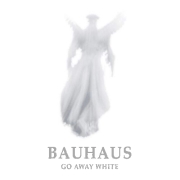 With the temperature dropping, it's time to find someone to keep you warm. Find your hookups with our online dating guide!
With the temperature dropping, it's time to find someone to keep you warm. Find your hookups with our online dating guide!
- Rock/Alternative
- 2008
- Buy the CD
Reviewed by Jason Thompson
()
The band formed in 1978 and disbanded in 1983 after the release of four proper studio albums. They briefly reunited in 1998, resulting in a live album (Gotham) and once again in 2005. It looked like the band might be making a comeback for good, as work began on a fifth studio album in earnest in 2006, but drummer David Haskins announced that “an incident had occurred” and so the band split again, but not before finishing work on the new release. That album is what we have here. Go Away White was recorded in 18 days in Ojai, California; according to the press materials, the band played together in one room, “taking first takes as final cuts.” While at the time of recording this may have seemed like a good move in the traditional experimental ways of Bauhaus, in the end it really sounds like nothing more than some live demos.
Things get clicking along decently enough with the opening track, “Too Much 21st Century,” yet another Peter Murphy meditation inspired through glam rock. But since the arrangements are so sparse, what we’re left with is something that sounds more akin to Television doing a quick run-through than anything Bowie-worthy. David Haskins’ drumming leaves a bit to be desired, as its straight-ahead, no-frills approach makes one yearn for a little action outside the elementary structure, but it never arrives. That waiting for any sort of arrival is further impeded by the outright dull “Adrenalin” that wants desperately to become some sort of experimental statement, but instead quickly bores the listener.
Likewise, “Undone” seems to be reaching for the sounds of those early ‘80s days, but the result sounds 20-odd years too late. Indeed, not being around all this time has allowed Bauhaus’ music to sound quaint, if not antiquated, and no amount of Peter Murphy or Daniel Ash/Love and Rockets hits can change that fact. With both “Adrenalin” and “Undone” it really sounds like the band was working out ideas live in the studio more than they had actual fleshed-out songs that would work as a cohesive whole. Could even the diehard fans get excited about this? It’s hard to say.
Yet both “International Bulletproof Talent” and “Endless Summer of the Damned” do feel like they were thought out, even if Haskins’ drumming seems to severely limit the former track once again. And although the latter tune has a completely ridiculous title, it grooves well enough to snap the listener out of any listlessness he may have felt early on. Even “Saved,” Murphy’s big psychedelic-infused moment of the album, is decent enough, even if it doesn’t come off as the grand statement it seems like it was meant to be.
From there, it’s a muddle once again with “Mirror Remains” and “The Dog’s a Vapour” coming off as embarrassing attempts to reach back into the good old Goth closet and hopelessly dating the band instantly. “Black Stone Heart,” on the other hand, shows that Peter Murphy’s allegiance to David Bowie can still swing strongly when in full effect. But the problem with this is that listeners will instantly pick that up and possibly consider Murphy to be nothing more than a good Bowie wannabe at this point in time. Really, what is the relevance here? It’s hard to say.
And as the album ends with “Zikir,” an absolute mess that showcases Goth music’s worst tendencies, one might almost feel relieved that Bauhaus decided to officially call it a day. Go Away White isn’t so much a swan song as it is a flimsy epitaph. Sometimes you really can’t go home, and perhaps the band realized this, and that was the “incident” that occurred. It seems logical that the diehard fans will want to pick this one up, but it’s hard to imagine them finding much to celebrate here. Whatever the case, Bauhaus is officially done, offering not much at all to say before turning the lights out for good.
You can follow us on Twitter and Facebook for content updates. Also, sign up for our email list for weekly updates and check us out on Google+ as well.











